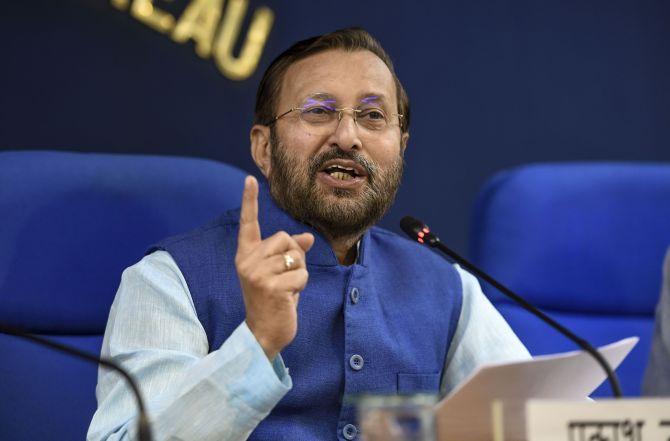Union Minister of Information and Broadcasting Prakash Javadekar on Monday disapproved of "TRP-centric journalism", saying metres installed in 50,000 houses cannot measure the opinion of crores of people.

He also asserted that the freedom of press has to be preserved at any cost in a democracy but media should remember that freedom comes with responsibility.
"TRP-centric journalism is not good. The metres installed in 50,000 houses cannot measure the opinion of 22 crores. We would expand its circumference so that we know what the people watch and what they wish to watch," he said at an Indian Institute of Mass Communication event.
He advised media students not to be trapped in sensational or TRP-centric journalism and asked them to imbibe the skills of healthy journalism, ensuring that anything good happening in society also becomes news.
Inaugurating the orientation programme of the IIMC for the academic session 2020-21, Javadekar stressed that people should welcome the change emerging in the education sector through digital technology and draw benefit from it.
The minister said that the freedom of press has immense value in a democracy and it has to be preserved at any cost.
"But we should keep in mind that freedom comes with responsibility. Therefore, every one of us has to be responsible. As a journalist, you understand both the aspects of the story, but your reporting should lead society in the right direction," he said at the virtual event.
The minister said journalism is a responsibility, "not a tool to mislead people".
"There is no need for any drama or sensation if your story is based on facts. There are plenty of constructive stories in society, but sadly nobody in the media has time to publish them," he said.
Javadekar said the first lesson of journalism is that everything impacting the lives of people is news and it should find adequate space in the media.
In this regard, he listed several schemes of the central government that have helped citizens.
The minister said fibre connectivity in about two lakh villages has transformed the lives of millions of people in rural areas.
"One can now watch 104 channels and 50 educational channels free of cost through the Doordarshan free dish. Three hundred community radio stations offer new opportunities to local artists and a change is clearly visible in those areas.
"About 2.5 crore people have received houses under Pradhanmantri Grameen Aawas Yojana.
"About 12 crore people have received toilets. Equally, eight crore gas connections have been provided under Ujjawala Yojana. Forty crore people have bank accounts now and about 50 crore people have the facility of free treatment up to Rs five lakh. Is this all not news?" he asked.
"I say, other happenings are also news, but these too are news. Contribution to the growth of society is the duty of journalism," the minister added.
Apart from Director General of IIMC Professor Sanjay Dwivedi and Additional Director General K Satish Nambudiripad, all faculty members of IIMC from regional centres and students joined the orientation virtually.
Dwivedi, interacting with the students, said nothing is dear to a teacher than his/her students.
"All our efforts in IIMC aim at ensuring high-quality education and training to our students. Our objective is not merely to produce journalists. We want to produce global leaders who lead the world of journalism and mass communication in the coming decade," he said.
On Tuesday, eminent filmmaker Subhash Ghai, editor of 'Hindustan Times' Sukumar Ranganathan, editor of 'Organiser Weekly' Prafulla Ketkar, Vice-Chancellor of Gautam Buddha University Bhagwati Prakash Sharma and director of Centre for Policy Studies, Chennai, J K Bajaj will interact with the students on different topics.











 © 2025
© 2025